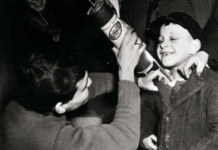Rejecting the “Medications for Schizophrenia” Narrative: A Survivor’s Response to Pies and Whitaker
As a psychiatric survivor who has personally experienced severe psychosis, my criticisms focus on the relative lack of attention to what psychiatric drugs actually are, and on the uncertain, contested nature of the supposed target of these drugs: “schizophrenia.” I will elaborate on each of these points with references, as well as highlighting alternative approaches to helping psychotic people.
It’s Possible — and Beneficial — to Stop Feeling Guilt and Shame
I believe the emotions of guilt and shame are culturally induced negative emotional experiences that almost all of us are tragically made to feel from infancy or childhood on. But guilt and shame are not now, nor ever were, hard-wired human emotional necessities.
Dear Son: A Mother’s Experience of Psychiatry, Racism and Human Rights
I wanted to spare you, my son, from suffering like I did. I wanted to give you every opportunity I could. You have grown into a good man, a caring and successful man, yet you still have to fear for your life in this country. You still feel pain when you see what is happening.
Depression, Antidepressants, and Expectancy
This study reinforces a large body of evidence suggesting that an individual’s expectancies for improvement significantly contribute to their actual improvement. The importance of expectancies is worth paying attention to now as more clients, clinicians, and researchers are endorsing a reductionist view of psychological disorders -- i.e., that psychological disorders are fundamentally brain disorders.
Enough is Enough Series, #5 – The ADHD Fiction is Exposed. The French Have...
The time has come that the fictitious ADHD qualifies for my ‘Enough is Enough’ series. It’s time to stop addressing pharmaceutical psychiatry on its own terms: its fraudulent and corrupt 'science,' its spurious 'evidence base,' and its imaginary psychiatric ‘diseases.’ I’m done with this. The evidence is in. Let’s get real. Psychiatry has become a profession of drug pushers. As a psychiatrist I am beyond troubled. Let’s get real.
The Algorithm Will See You Now: A Geek Tragedy
We would, in fact, save vast amounts of money by giving the pharmaceutical companies ten times the inflated prices they currently receive for drugs as part of a bargain that ensures only 10% of those currently taking lipid-lowering drugs, antidepressants, biphosphonate and other drugs end up on them. The savings would come from not having to treat treatment-induced disabilities.
Helpful and Hopeful Thoughts
The basic idea behind successful psychotherapy is that our thoughts create our feelings. And, luckily, our thoughts are changeable. I have personally experienced how liberating only one thought can be to a complex problem. That's why I would precent some of the thoughts that I have found most useful personally, and in therapy with patients, over 25 years.
Searching for a Rose Garden: Challenging Psychiatry, Fostering Mad Studies
Searching for a Rose Garden:
Challenging Psychiatry, Fostering Mad Studies is a timely and unique collection of essays that should be of interest to anyone with personal experience with, or research interests in, mental difference, psychiatrization and its resistance.
My Daughter and Prozac
While our daughter was growing up, my ex-wife treated our daughter’s body like a temple. She was the only kid among her friends not allowed to drink soda or cow’s milk as they might negatively affect her health. But Prozac for mild anxiety? Sure, no problem. I was honestly and genuinely shocked.
Confessions of a Trespasser
In a recently published commentary in Psychiatric Times, Ronald Pies and Joseph Pierre made this assertion: Only clinicians, with an expertise in assessing the research literature, should be weighing in on the topic of the efficacy of psychiatric drugs. They wrote their commentary shortly after I had published on madinamerica “The Case Against Antipsychotics,” and it was clear they had me in their crosshairs.
Psychiatric Ethics
When psychiatrists conduct "diagnostic" assessments on public figures, they are drawing attention to the fact that psychiatry's "diagnostic" system is more like a children's matching test than a genuine medical nosology. They are drawing attention to the fact that the Emperor has no clothes. And we all know where that leads.
How Psychiatry Almost Stopped Burning Man: A Story of Hell and Liberation
As Burning Man nears its 30th anniversary, USA Today has published an article attempting to explain how this still somewhat freakish event came into existence. I enjoyed the article, but as someone involved in the origin story it tells, I believe that an important piece is being left out. This relates to how misguided “mental health treatment” came close to disabling a key organizer of the early Burning Man. This piece is a fascinating tale in itself, but more fascinating when considered as just one example of how a flawed approach to mental health treatment forms a barrier to many forms of cultural evolution and renewal, with oppressive consequences for society as a whole.
Backing Away from Psychiatry
I believe now that fifteen years is more than a fair try. Fifteen years of getting treatment without returning to function is actually insanity. I should have given up after year two. Instead of trusting my intuition and insight, I pushed it down and down... until it finally fought its way back to the surface.
Dear Boston Globe, Part IV: A Taste of Your Own Medicine
The Boston Globe paints a picture (in the vivid way that they so love to do) that pins the system’s decline primarily on budgetary issues, but there is more than one way for a system to be ‘broken.’ In fact, where the Globe goes most wrong in their latest piece, ‘Community Care,’ is in their failure to adequately recognize that the system has always been broken in one way or another in this country.
Optimizing Children’s Mental Health is a Social Justice Issue
I can spout off the most amazing strategies for optimizing children’s mental health, such as feeding them real food, making sure they get lots of unstructured playtime in natural spaces, loving them unconditionally, and guiding them to the intersection of their skills and passions. But if a parent doesn’t have the financial/emotional/physical/mental means to act on these strategies, it is for naught.
The Real Narrative of Life
Every story is unique. But the path always leads back to one’s Authentic Being. Love is the sustenance, and authenticity is the fountain of our aliveness. Yes we are talking about psychiatry here. All of psychiatry flows from damage to our plays of consciousness. This damage comes from trauma, abuse and deprivation, in our formative years. Additional trauma can rewrite and darken our plays at any time for the rest of our lives. The interplay between our temperaments and problematic experience generates psychiatric struggle. This encompasses all of psychiatry, period.
The ADHD Dilemma: Looking Beyond Big Pharma
Alan Schwarz aligns himself with the current mental health paradigm by opening his new book ADHD Nation: Children, Doctors, Big Pharma and the Making of an American Epidemic with this statement: “Attention deficit hyperactivity is real. Don’t let anyone tell you otherwise.” However, later on in the book he captures the fallacy of this disease model when he quotes a clinician: “We’ve decided as a society that it’s too expensive to modify the kid’s environment. So we have to modify the kid.”
Can Co-production Really Transform UK Mental Health Services?
Is "co-production" public service citizen involvement? Is it individual, ‘responsibilised’ health and social care consumerism? Is it power shifting to communities through participatory governance? Perhaps it’s the ultimate post-modern policy concept. But can it work for mental health?
Fighting For Change: An Epiphany From Inside the “Movement”
I am a person labeled with “severe and persistent mental illness,” and so I have been trying to break the cycle of oppression that comes with a label like that. At the same time, I am trying to find ways to heal and to accept things about myself that are different from others, while also seeking to raise up my brothers and sisters in this desolate and dark place. This morning, I had an epiphany upon awakening. While it's hard to put into words, it feel's vital, and I want to try and get it down.
Not So Rare But Rarely Diagnosed: From Demonic Possession to Anti-NMDA Receptor Encephalitis
Throughout the ages, convulsions, contortions of the body and face, including the tongue, super-human strength, catatonic periods, long periods of wakefulness or sleep, insensitivity to pain, speaking in tongues, and a predilection for self-injurious behaviours have all been offered as physical evidence of possession. The modern day interpretation, however, comes with a plot twist befitting a media spectacle. There is growing consensus in the medical community that many prior accounts of “demonic possession” may have represented original accounts of what is now broadly known as autoimmune encephalitis.
A Diluted Murphy Bill Clears the House and Goes to the Senate
Organized psychiatry, committed irrevocably and wholeheartedly to drug pushing and to their corrupt and corrupting relationship with pharma, simply will not countenance the fact that their primary product is fundamentally flawed and destructive. So they hire a PR company; they fund and lobby politicians; they parrot slogans; and they encourage one another to ever-increasing heights of self-congratulation. But they will not commission a definitive study to clarify and assess the scale of this problem once and for all. And the reason for this inaction is because they know that it would be bad for business. It would "cause a lot of people to stop taking their medications."
Who and What Killed Prince and Michael Jackson? Will the Role of Benzos Ever...
It is the deadly cocktail of benzodiazepines and opiates that is most responsible for the rising rate of opiate overdose deaths... and benzos may actually be THE decisive deadly component in the lethal drug combination. Yes, fentanyl and propofol can be dangerous drugs, but to focus the main attention in this crisis on these rarely used drugs is deliberately misleading...This minimizes the critical role of benzos and rather conveniently lets certain institutions and their leaders off the hook as the main suspects in such a vast number of cases that should be labeled as crimes of negligent homicide.
What Does Your Illness Mean?
Nine months after the birth of my first daughter, I felt off. Flatness, forgetfulness, cold, and tired. If I hadn’t discovered my formal diagnosis of an autoimmune thyroid condition, I could easily have been offered an antidepressant. Instead, I delved into the complex physiology of the immune system and its relationship to seemingly unrelated areas like the gut and brain. I learned pathways and the role of nutrients in their optimization. I changed my lifestyle, and my life changed as a result.
Researching the Link Between SSRIs and Violence
In 2010, my 25-year old son was prescribed Prozac for depression. After a psychiatrist doubled his dose, my son became acutely psychotic and had to be admitted to the hospital. Over the next twelve months, during which time he was treated with antidepressants and neuroleptics, my son had five further psychotic experiences. I thought it might be that my son was having difficulty metabolising the drugs.
Pushing for an Informed Consent Benzo Bill in Texas
Dr. Raymond Armstrong and I are currently working together to push Texas lawmakers to adopt restrictions on the prescription of benzodiazepines and sleep drugs. We feel fortunate to be able to draw from the experience of the benzo movement in Massachusetts, and we are grateful for the information that long time advocates like Geraldine Burns have provided us.













